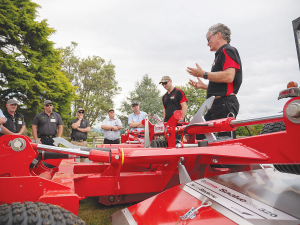Made in New Zealand looks at the wealth of design and manufacturing ability we have in New Zealand, creating productive and cost-effective products for the agricultural sector. Machinery editor Mark Daniel takes a closer look at Trimax Mowing Systems, catching up with owner and founder Bob Sievwright.
Q - When was the company founded, by whom and why (was it to solve a problem or market a product)?
Trimax was formed in 1981 from two Bay of Plenty mower companies that I purchased to market the Gamma Flail that I had developed. Its design reduced power consumption and delivered a better cut than any other flail on the market. So much so, that most flails today are modelled on the original Gamma Flail design. Today in 2021, we're celebrating 40 years in business.
Q - Where are you located? Is it single or multiple sites and how many people are employed?
Our main office and manufacturing facilities are in Tauranga. We also manufacture in the US and the UK and have a distribution hub in Australia. Globally we have around 130 employees, the majority are based in New Zealand.
Q - What are your key products and which markets do they serve?
Trimax specialises in commercial mowing equipment to suit a variety of applications. This includes lifestyle blocks, orchards, municipals, golf courses, sports fields and turf farms. Our versatile and innovative range of rotary and flail mowers deliver a high-quality cut, even in the mot challenging environments.
Q - Are your products unique? If so, what are the four key benefits? If not unique, what are the four unique selling points?
Trimax has worked closely with customers to develop new innovations, many brought about to directly contribute to our customers' bottom line to reduce maintenance and increase productivity. Our mowers are renowned for having a long commercial life; with 35-year-old Trimax mowers in the field that are still delivering a great cut! Alongside the low cost of ownership, our service back up is second to none with local support staff and parts warehouses in each of our key markets - with next-day despatch on parts orders. We are a truly New Zealand company, that since 1981, has carried out all our R&D and most of our manufacturing in the Bay of Plenty - and will continue to do so.
Q - Looking at an ever-evolving market, what changes have you made over recent years, or what will you have to do moving forward?
Our team is remarkably agile, working hard to position ourselves at the forefront of product design and business practices. Currently, we're watching the growing trend towards automation and investigating ways to bring this into our products and processes. We're also looking at our environmental sustainability as we anticipate its increasing importance to our industry.
Q - What has been the company's greatest success since its formation?
We really value our achievements in establishing an international presence, thanks to our local teams, who develop close relationships with our customers. A standout was breaking into the US market and establishing a manufacturing facility in the state of Georgia. It can take years of trial and error to gain a foothold in overseas markets, and we're very proud of the growth we've seen.
Q - In contrast, what has been the biggest "Oh Bugger" moment or the steepest learning curve?
We have had to learn to adapt to each specific market, with the need to design products to meet market-specific needs and preferences - all the while, relying on our technical expertise and pillars of culture to guide our connections to our customers. The steepest learning curve to date has been in the US, when we finally realised that the Americans 'do it their way'.
Q - If you were approached by someone looking to start a business, what would be your three key pieces of advice?
Keep a narrow and intense focus and become the best in the world at what you do. Think globally, always considering your international opportunities. Importantly, embrace your mistakes as learning and growing experiences.
Q - Where do you see the company in the next three, five and ten years? What changes do you foresee to keep relevant and grow your business?
Over the next three to five years, we will invest heavily in our development capabilities and customer relationships to support the growth of our business. We'll also have a special focus on growing our international markets. As for the next ten years - we have a plan, but that will have to be a surprise!


















